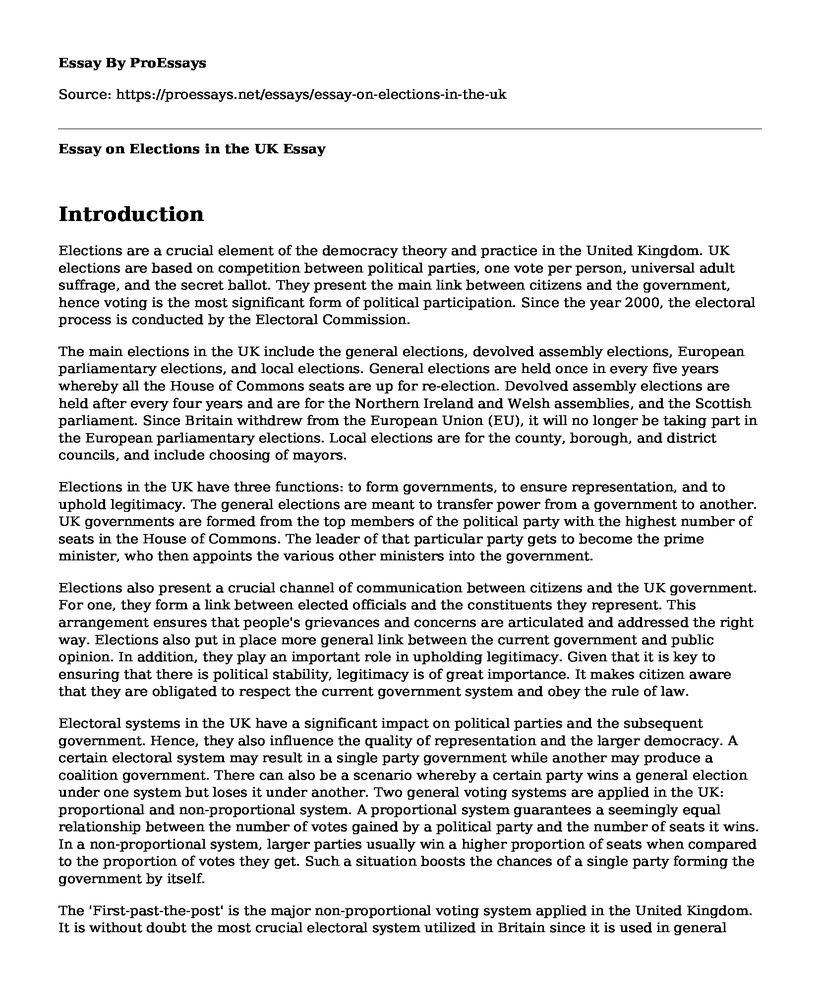Introduction
Elections are a crucial element of the democracy theory and practice in the United Kingdom. UK elections are based on competition between political parties, one vote per person, universal adult suffrage, and the secret ballot. They present the main link between citizens and the government, hence voting is the most significant form of political participation. Since the year 2000, the electoral process is conducted by the Electoral Commission.
The main elections in the UK include the general elections, devolved assembly elections, European parliamentary elections, and local elections. General elections are held once in every five years whereby all the House of Commons seats are up for re-election. Devolved assembly elections are held after every four years and are for the Northern Ireland and Welsh assemblies, and the Scottish parliament. Since Britain withdrew from the European Union (EU), it will no longer be taking part in the European parliamentary elections. Local elections are for the county, borough, and district councils, and include choosing of mayors.
Elections in the UK have three functions: to form governments, to ensure representation, and to uphold legitimacy. The general elections are meant to transfer power from a government to another. UK governments are formed from the top members of the political party with the highest number of seats in the House of Commons. The leader of that particular party gets to become the prime minister, who then appoints the various other ministers into the government.
Elections also present a crucial channel of communication between citizens and the UK government. For one, they form a link between elected officials and the constituents they represent. This arrangement ensures that people's grievances and concerns are articulated and addressed the right way. Elections also put in place more general link between the current government and public opinion. In addition, they play an important role in upholding legitimacy. Given that it is key to ensuring that there is political stability, legitimacy is of great importance. It makes citizen aware that they are obligated to respect the current government system and obey the rule of law.
Electoral systems in the UK have a significant impact on political parties and the subsequent government. Hence, they also influence the quality of representation and the larger democracy. A certain electoral system may result in a single party government while another may produce a coalition government. There can also be a scenario whereby a certain party wins a general election under one system but loses it under another. Two general voting systems are applied in the UK: proportional and non-proportional system. A proportional system guarantees a seemingly equal relationship between the number of votes gained by a political party and the number of seats it wins. In a non-proportional system, larger parties usually win a higher proportion of seats when compared to the proportion of votes they get. Such a situation boosts the chances of a single party forming the government by itself.
The 'First-past-the-post' is the major non-proportional voting system applied in the United Kingdom. It is without doubt the most crucial electoral system utilized in Britain since it is used in general elections and thus serves to form subsequent governments. All in all, it leads to disproportionality as it is mainly concerned with electing individual members rather than the representation of various parties.
Cite this page
Essay on Elections in the UK. (2022, Jun 06). Retrieved from https://proessays.net/essays/essay-on-elections-in-the-uk
If you are the original author of this essay and no longer wish to have it published on the ProEssays website, please click below to request its removal:
- Essay on Policy Mixes
- The Corrupt Bargain Essay Example
- Corruption Scandal Within Georgia Department of Correction Paper Example
- Questions and Answers Essay on Government Intervention in the Economy
- Government Ethics and Compliance Essay Example
- Essay on America's Reputation for Democracy: Slavery and Expansion in the 1850s
- Confucian Principles in Government: Examining Harmony, Education, and Leadership - Essay Example







